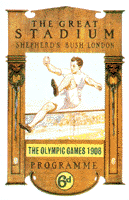HISTORY OF THE MODERN OLYMPICS
London, England, 1908
 |
| Olympic posters from the Archives, Olympic Museum Lausanne, from the book The Olympic Spirit, published by Tehabi Books |
Twenty-two nations and about 2,000 athletes participated. The opening ceremony and the majority of events were held at Shepherd's Bush Stadium. New events included diving, motorboating, indoor tennis, and field hockey. The track-and-field events were dominated by bickering between American athletes and British officials. The 400-metre final was nullified by officials who disqualified the apparent winner, American John Carpenter, for deliberately impeding the path of Wyndham Halswelle of the United Kingdom. A new race was ordered, but the other qualifiers, both American, refused to run. Halswelle then won the gold in the only walkover in Olympic history. Another disputed finish occurred in the marathon. Dorando Pietri of Italy had a large lead as he entered the stadium but collapsed a few hundred metres from the finish. Officials came to his aid, helping him to his feet several times and nearly carrying him across the finish line. After a protest by the U.S. team, Pietri was disqualified and American John Hayes was awarded the gold medal. Henry Taylor of the United Kingdom starred in the swimming events, winning three gold medals.
Introduction * Early History * Revival of the Olympics * Organization of the Modern Games